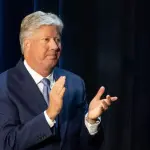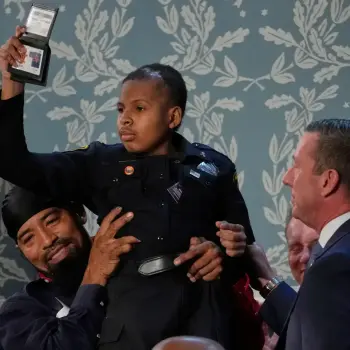It might not surprise you to learn that last year saw the highest number of state-based conflicts in the world since 1946. The number of battle deaths was driven mainly by Russia’s ongoing invasion of Ukraine and the war initiated by the Iranian proxy Hamas against Israel. Non-state actors like Hezbollah in Lebanon and drug cartels in Mexico are responsible for much of the violence as well.
Here’s what such instigators of violence have in common: they are all autocracies.
Related stories in the news:
- Russian soldiers are raping women and attempting to erase Ukrainian evangelical churches in occupied territory.
- Vladimir Putin is increasing his alliance with North Korea and deepening relations with Vietnam, following his “new era” of partnership with Communist China.
- Iran is accelerating its nuclear program.
- China continues modernizing and expanding its nuclear arsenal.
Again, all autocracies.
When the “other side” is evil
According to Pew Research Center, a majority of people around the world are dissatisfied with the way democracy is working. By contrast, another Pew study finds that more than eight in ten adults in Hong Kong and Taiwan say democracy is a good way to govern.
Note that democracy is threatened by autocracy in both places.
Interestingly, one of the chief complaints of those who are dissatisfied with democracy has to do not with the system but with those leading it: 61 percent do not agree that “elected officials care what ordinary people think.” And so, as we noted yesterday, democracy works to the degree that the people who vote and the leaders they elect are people of virtue capable of self-governance.
There’s another issue threatening our democratic future as well: a growing belief that the foundational ideals at the heart of our system should be questioned if not repudiated. This comes in part from those who believe corrupt politicians are leveraging the constitutional protections of free speech to undermine our democracy. And it also comes from Critical Theory advocates who are convinced the American experiment itself was launched by white supremacists who leveraged the governance they created for their personal advancement.
Here’s why such skepticism is so damaging: if we come to believe that the “other side” is evil, we will engage in zero-sum partisanship in which you are either a corrupt politician or their naïve victim, either a racist or an enemy of the country.
And our future as a democracy is imperiled.
“Made only for a moral and religious people”
The US Constitution was ratified on this day in 1788. As political scholar Yuval Levin documents in his brilliant new book, those who authored our founding document saw the diversity of colonial America as one of our great strengths. In response, they created a system of checks and balances by which we are required to debate, vote, legislate, and lead through eventual consensus.
As he notes, our system can be laborious and frustrating, but this is by design.
However, this system requires us to engage with each other on a basis of mutual respect and shared morality. Accordingly, it works to the degree that we are willing to forgive those who harm us, work with those who disagree with us, and seek the common good above our own.
This commitment to consensuality is one reason John Adams was so adamant that the Constitution was “made only for a moral and religious people” and is “wholly inadequate to the government of any other.”
And it shows why being a “moral and religious people” requires the character-building power of God’s Holy Spirit.
“Why so many are devoted to causes”
None of us is, by nature, inclined to forgive those who harm us or work collegially with our ideological opponents. Our basic survival instinct, coupled with our fallen “will to power,” motivates us to seek revenge rather than reconciliation, conquest rather than compromise.
To exhibit the love, joy peace, patience, kindness, goodness, faithfulness, gentleness, and self-control of the Spirit (Galatians 5:22–23), we must be empowered and controlled by the Spirit (Ephesians 5:18). This requires a lifestyle of submission, a constant prayer to be made holy by our Holy God. And this is exactly how Jesus taught us to pray.
St. Cyprian of Carthage (died AD 258) commented on the Model Prayer request, “Hallowed be thy name”:
This is not because we want God to be made holy by our prayers: what we are asking God is that his name should be hallowed within us. After all, how can anything be needed to sanctify God, who himself is the source of sanctity? . . . And this we pray daily, for our need is for daily sanctification so that we who daily fall away may wash away our crimes by continual sanctification.
Such “continual sanctification” is empowered by a continual focus on the One to whom we pray. Oswald Chambers warned us with words that relate directly to our theme: “Today we have substituted creedal belief for personal belief, and that is why so many are devoted to causes and so few devoted to Jesus Christ.”
By contrast, he stated:
“Discipleship is based on devotion to Jesus Christ, not on adherence to a belief or a creed.”
According to Chambers, “We count as service what we do in the way of Christian work; Jesus Christ calls service what we are to him, not what we do for him.”
What will you “count as service” today?
Friday news to know:
- Nuclear terrorism “risks are high,” researchers warn
- Undecided voters await Biden-Trump debate with eye on economy, border and age
- US job market shows signs of cooling; housing still struggling
- Supreme Court upholds Trump-era tax provision
- On this day in 1964: The KKK kills three civil rights activists
*Denison Forum does not necessarily endorse the views expressed in these stories.
Quote for the day:
“Salvation is free, but discipleship will cost you your life.” —Dietrich Bonhoeffer












